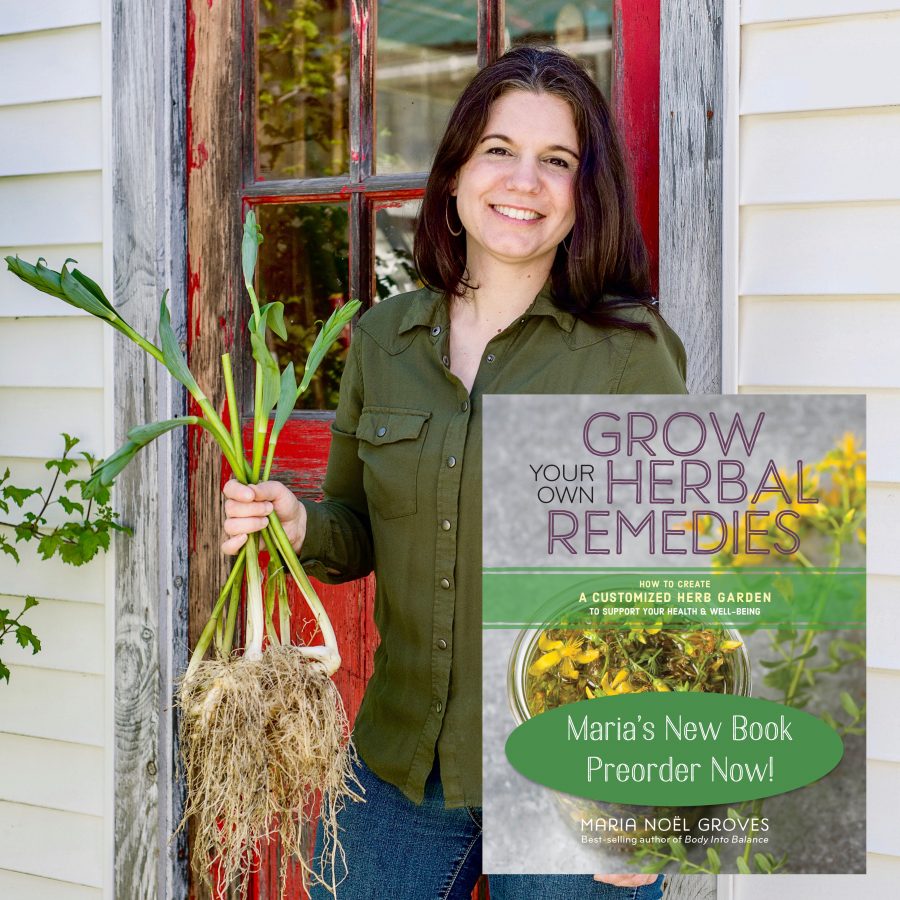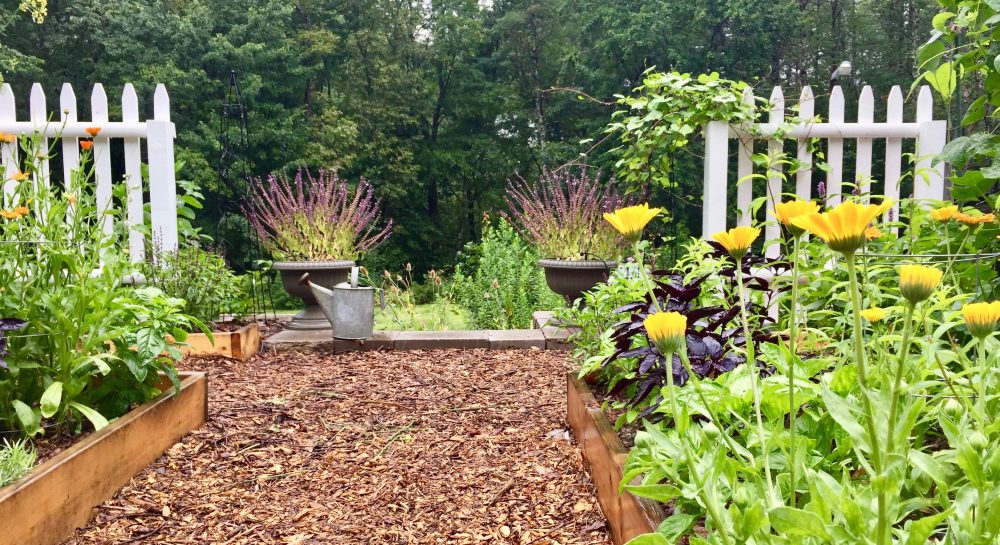Spring will soon be in the air! February and March are an excellent time to start planning for your spring garden and order and plant seeds or think about what seedlings you'd like to purchase.
Garden Planning & Planting
First off, what would you like to plant? Perhaps you have your old favorite herbs that you just need to grow every year for pleasure, food, and medicine. Or maybe you'd like to expand your garden with some new herbs. In my book Grow Your Own Herbal Remedies, I help you discover easy-to-grow herbs based on health concern so you can tailor your garden to you and your family's individual health needs.
Also consider your growing conditions. Is your garden shady or full, unrelenting sun? Do you need to stick with plants that you can grow in containers? Do you need to create some new raised beds to accommodate your new or expanding garden? How would you like your garden laid out? Ideally it's in a spot with good sun and soil and easy access to water. Consider a spot that's easy to access or walk by regularly so you won't forget about them and can grab a handful whenever you need it and also pluck out baby weeds as they sprout.
I use the no-dig lasagna gardening technique: using cardboard as the first layer and then covering it with leaves, twigs, compost, and loam. Chopped leaves make a great top layer of mulch that will enrich the soil throughout the season. This is best created fall the season prior so the soil has a chance to settle and become alive with beneficial microbes, but you can technically make and plant your new bed all in the same day. A sprinkle of Pro-Gro organic fertilizer or an application of aged compost will help revitalizing the soil at planting time.) Also pay attention to your growing zone, especially for plants that you hope to overwinter as perennials. Most new seedlings, direct-sown seeds, and annuals do best planted in spring after the threat of frost but while it's still somewhat cool and rainy. Some plants and seeds can be planted earlier and withstand frost just fine. Most plants need 6 to 12 inches (or more) of space between them so they have room to grow without too much competition. After you plant your seedlings and they've gained a bit of height, mulch around them with chopped leaves to help hold moisture and discourage weeds, but make sure you don't inadvertently smother your new plants.
Everyone has a different set of "top 5 herbs." Mine would probably be...
- 1. Holy Basil: grown as an annual in full sun and rich, well-watered (and well-drained) soil for stress, energy, cognition, blood sugar balance, delicious in many ways including infused water and tea
- 2. Lemon Balm: grown as a perennial in partial to full sun in rich, well-watered (and drained) soil for calming, uplifting, sleep support, and focus/cognition as well as better digestion and herpes, excellent in tea, infused water (especially with holy basil), and tincture
- 3. Marshmallow: grown as a tall perennial in full sun, rich, semi-moist soil for soothing, moistening, gut healing properties as well as an excellent background ingredient in tea blends -- I love the root, but from my garden I mainly work with the leaves and flowers because they're so easy to harvest and use
- 4. Ashwagandha: grown as a tender perennial in full sun and semi-dry soil without competition, for deep energy, thyroid support, immune modulation, and decreased inflammation -- I use the dried root for tinctures mainly but will also add it to tea, warm milk, nut butter-honey energy balls, and broth.
- 5. Motherwort: grown in partial sun, rich, somewhat moist soil, for mood and anxiety support including acute relief of panic attacks and tonic effects for emotional roller coasters, also a lovely heart tonic, best as a tincture or vinegar extract because it's terribly bitter
- Honorary Addition: Rugosa Roses: a somewhat invasive shrubby rose that thrives in poor soil and in full-sun -- I love adding the fresh rose blossoms to water and other recipes to ease stress, gladden the heart, and uplift the spirits. Rose glycerite is divine, and I also enjoy a little sprinkle of dried petals in tea blends.
Getting & Using Seeds
There are pros and cons to starting with seeds versus seedlings. The pros: you have access to a much wider selection of plants, and you can economically grow a lot of each species (one seed packet usually yields 20 or more plants). The cons: seeds (especially herb seeds) can be finicky to germinate, need supplies and space for growing, and require a lot of TLC for success. Also, usually one to four plants of a particular species is plenty for home use. I'd rather have 20 different plants than 20 of the same thing.
If you decide to start with seeds, you'll want to read the seed packet or catalog for important details like when and how to plant it and any special things you need to do to ensure better germination (stratification, scarification, etc.). Pay attention to how many days it will take to germinate, and then how much longer until it reaches maturity. Most seeds will need to be started indoors in February or March so they're ready to plant in May, but it can vary quite a bit. Other seeds can be direct sown into the soil in early spring as soon as the ground can be worked or after the threat of frost or even in fall the previous season.
Seedlings do best in special soil designed for starting seeds in small containers that hold moisture but allow drainage. You'll need to pre-moisten the soil with water before you pack it into the pots and plant your seeds. Toilet paper rolls with one end folded in make excellent seedling pots that you can later plant right into the ground. You might put a plastic bag or cover over your plants until the seedlings germinate to hold in moisture, but be sure to open them up once the seedlings sprout or they'll dampen off and die. Be sure to use grow lights (much more effective than windows) and perhaps the light breeze of a fan to strengthen the plant stems and keep pests away. Water carefully so they don't get too water logged nor dry out. Once the outside environment and your seedlings reach the sweet spot, begin to "harden them off" with increasing time outdoors, then gently plant the in the ground and water well. Keep an eye on them those first few weeks, making sure they're protected and well watered.
I rarely plant seeds because I simply don't have the time and inclination to baby little indoor seedlings, nor do I need a whole flat of one plant. I've killed enough seedlings over the years to know better. The only seeds I plant are those that a I can direct sow in the ground that don't need much input from me for success: oat (sold as a cover crop), calendula, California poppy, dill, plus a few extras like pole beans, snap peas, and nasturtiums.
Where to Buy Seeds
If possible, try to buy organic seeds from a reputable supplier. It's even better if they're close to your ecosystem. Some of my favorites...
- Natural Food Stores, Local Hardware/Feed Stores & Garden Centers often sell a selection of common herbs, flowers, and vegetables. You might even be able to find organic seeds.
- Strictly Medicinal Seeds in Oregon offers probably the largest selection of medicinal and organic herb seeds available anywhere! Richo and his team do an excellent job with even unusual and hard-to-grow plants. Germination may be tricky, though. They also offer several seedlings by mail in spring (such as passionflower that you can trust is actually the one species used medicinally).
- High Mowing Organic Seeds in Vermont offers common culinary and medicinal seeds as well as cover crop oats. They sell out quickly and a small selection of their offerings may be available in your natural food store in early spring.
- FedCo Seeds in Maine offers organic seeds including a modest selection of medicinal seeds as well as trees, shrubs, and perennials.
- More seed sources listed here.
I'll be honest: I plant very few seeds and vastly prefer to work with seedlings and potted perennials...
Where to Buy Seedlings
You'll want to wait to actually acquire your seedlings until it's closer to planting time, but early spring is the perfect time to plan and preorder seedlings to help ensure you get what you want.
Definitely seek out local growers first and foremost. They'll have the varieties best suited for your climate, and your plants won't be damaged by stressful travel through the mail. Poke around to find organic herb seedling and perennial growers near you. They might have full-fledged nurseries or ask you to preorder plants that you come get during a specified time period. Also check out local herb and garden clubs, which often host annual plant sales in the spring including the Herb Society of America as well as American Herbalist Guild Chapters.
Some of my favorite herb seedling growers here in/near New Hampshire:
- NH Herb & Garden Dayin June offers organic herb seedlings from several growers that you can buy there on the spot or preorder.
- Found Well Farm in Pembroke, NH offers veggie and select medicinal seedlings by preorder and drop-in as well as perennial native (often medicinal) wildflowers, shrubs, and trees. Very affordable and certified organic. This one-woman show has open hours in May only for drop-ins. This is the first place I stop in spring. She sells her leftovers at Herb & Garden Day, too.
- Warner River Produce in Webster, NH focuses mainly on veggies but has a large selection of culinary and medicinal herb seedlings to sell in the spring at the farm, Herb & Garden Day, and by preorder to pick up at various area farmers markets. Crop failures are not uncommon, so there is no promise you'll get exactly what you preordered, but it'll be close. Jim's my main source for herb seedlings, which I pick up at a farmers market or preorder to get at Herb & Garden Day.
- Anything Grows (formerly the Herb FARMacy) in Salisbury, MA New ownership 2022 - unfortunately the herb selection isn't as good as it was with the prior owners.
- Other excellent NH sources for seedlings include Unity Mountain Herbs in Unity, Terra Basics in Chichester, and Good Earth Farm in Weare. Also check out the annual plant sales of the Rockingham Herb Society in Chester and the Herb Society of America (with units all over the country including the NH Seacoast Unit)
- More seedling sources listed here
Mail Order Seedlings come in handy if you live somewhere that local seedlings aren't available or you want unusual herbs. Be mindful of traveling temperatures so your herbs don't freeze or cook in transit. Mid-May works well for me. You can pay a lot to overnight herbs for the best chance of success or gamble with 2 or 3-day priority shipping. So far, I've lucked out with priority shipping in mid-May, even from across the country. I request mail-order sellers to wait until May to ship them so that the plants will travel in the most friendly weather and that I can plant them soon after arrival. You'll want to give your new plants a few days in a protected spot for the shock to wear off before you actually plant them in the ground. My seedlings-in-wait hang out in the a protected, part-shade spot right near my door (where I won't forget about them!) with easy access to water.
- Strictly Medicinal Seeds in Oregon has a great selection of unusual herbs. The plants I've ordered have arrived in excellent condition.
- Companion Plants in Ohio offers an excellent selection of medicinal seedlings, both familiar and unusual. The plants I've ordered have also arrived in excellent condition.
- Zack Woods Herb Farm in Vermont offers a selection of common, at-risk, and unusual medicinal seedlings and potted perennials that are usually of excellent quality.
Additional recommended online seedling sellers that I have not yet used:
- Crimson Sage Medicinal Plants Nursery in California offers an excellent, large selection of certified organic medicinal herbs and plants.
- Mountain Gardens in North Carolina. Joe Hollis specializes in Traditional Chinese Medicine plants sold as seeds or bare root live plants very affordably.
- Richter's in Ontario, Canada offers a large selection of live herbs, trees, shrubs, and seeds.
- More by-mail seedling sources listed here
Enjoy these transition months of late winter/early spring to get your garden game plan on so you're ready to hit the dirt when the ground thaws!
Learn More
- Maria's Backyard Medicine Class Notes available to download for free here, featuring growing tips, recipes, and uses for many of her favorite backyard herbs.
- My Mega Grow Chart (a free electronic companion to Grow Your Own Herbal Remedies)
- Maximize Your Herb Garden pre-recorded webinar 1.5 hour long, taught by Maria $25
- Grow Your Own Herbal Remedies by Maria Noel Groves teaches you how to customize your own herbal garden -- big or small -- based on your own health needs and garden habitat. The book is organized into 23 theme gardens based on health concerns and goals including first aid, delicious flavors, stress support, relaxation, cognition and focus, detoxification, nutrition, women's health, aches and pains, and more. Each themed garden features four to five key easy-to-grow herbs, their specific indications of use as well as growing needs, and simple, effective recipes you can make with your herbs. The book also includes tips for organic backyard gardening (including container gardening), basic remedy making techniques, and more than 50 detailed profiles of individual herbs. Common backyard wild herbs are also included. With 336 full-color pages, gorgeously photographed and laid out, you'll be inspired by how easy it is to grow and make your own potent herbal remedies and connect with the plant world in your backyard.Some examples of recipes you'll learn how to grow and make:
- Lemon Balm Catnip Glycerite for digestion, colic, and nervous indigestion
- Dandelion-Violet Leaf Pesto for deep nutrition, spring cleansing, and bone strength
- Nettle Oat Chai for nutrition and a tasty beverage
- Mineral Rich "Coffee" Syrup for gentle detoxification and minerals, excellent to use to sweeten herbal or traditional coffee
- Brainiac Bonbons as a daily energy and cognitive tonic
- Rose Sipping Water, Rose Hydrosol and Rose Glycerite to gladden your heart and de-stress your day
- My mom's Quick Dill Pickles to improve digestion and ease an upset tummy
- Multiple Gut Healing Tummy Teas for gut repair
- Elder-Rosehip Oxymel for immune support
- Aches & Pains, Strains & Sprains Tincture/Liniment featuring common wild weeds
- Calendula Comfrey Cream excellent for itchy and aging skin
- Allergy Tincture Blend for seasonal allergies

Clinical herbalist Maria Noël Groves sees clients and teaches classes at Wintergreen Botanicals Herbal Clinic & Education Center in Allenstown, New Hampshire.
The statements made on this blog have not been evaluated by the FDA and are not intended to diagnose, prescribe, recommend, or offer medical advice. Please see your health care practitioner for help regarding choices and to avoid herb-drug interactions.

